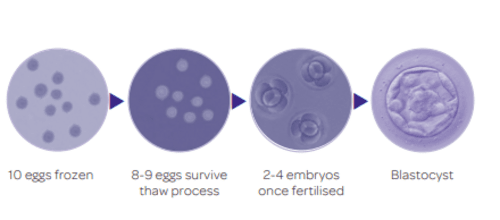
Egg Freezing Side Effects
Egg freezing is becoming an increasingly popular option for women who are not in a position to have children right now but want to in the future. It’s also an option for those who require fertility preservation due to medical reasons, such as cancer treatment.
The process, which involves extracting and storing eggs so they can be used at a later date, has many potential benefits. But there are also some possible side effects that should be taken into consideration before making the decision to freeze your eggs. While the majority of patients don't experience any side effects, or will only experience minor or temporary effects, it's in your best interest to stay informed. While we will cover the most common side effects here, be sure to read through our Guide to Egg Freezing and speak to your fertility doctor about any concerns with the egg freezing process.
What does an egg freezing cycle involve?
In the leadup to the egg-freezing cycle, patients are required to undergo hormonal stimulation. This is done via daily medications that are self-administered with a small needle to help their body produce multiple eggs for extraction, as well as ensure egg development.
Common side effects from medication
About a quarter of women report experiencing side effects caused by hormonal fluctuations, such as bloating, breast tenderness, headaches, mood swings, insomnia, hot or cold flashes, and mild fluid retention. When these side effects are reported, they are usually not significant and allow you to carry out all your normal activities throughout the period of stimulation. These side effects only last for the stimulation phase and will disappear when you move to the next stage and freeze the eggs.
Recovering from egg retrieval
The process ends when the frozen eggs have been retrieved from an egg collection procedure and stored. The retrieval itself only takes a short amount of time (less than 20 minutes) and is a minimally invasive procedure that uses a thin needle, so no cuts or stitches are required.
Other than feeling a little out of it from the anaesthesia and requiring assistance to get you home, there is almost no risk of complications for most women. There may be some pain when you wake up, such as cramps similar to your period, but these usually fade by the next day.
Potential risks of egg freezing
Complications of the egg collection
Ultrasound-guided egg retrieval normally causes some discomfort during or after the procedure and this can last for two to three days. This is not normally a sign of serious problems. However, as with any surgery, some serious complications can occur.
Infection: It is more common in women with previous pelvic disease such as blocked fallopian tubes or endometriosis but is still rare in this group.
Damage to other internal organs, including blood vessels, bladder and bowel: This is fortunately rare, in the order of 1 in 5000.
Ovarian Hyperstimulation Syndrome (OHSS)
This is a rare condition where some women over-respond to the fertility drugs and can develop fluid retention and abdominal swelling. In 1% of cases, it can be severe and may require admission to hospital for medical treatment.
OHSS is not very common for egg freezing cycles. If OHSS does occur, it usually becomes evident 2 – 8 days after egg collection and subsides 2 – 3 weeks later.
The symptoms you should be aware of and report immediately to us are:
- Severe nausea and vomiting
- Increased abdominal bloating
- Diarrhoea
- Shortness of breath
- Increasing thirst
- Decreasing urine output
The mild form of OHSS is usually adequately treated by rest, fluids and mild pain relief. More severe cases require hospitalisation with intravenous fluids and sometimes drainage of the fluid from the abdominal cavity.
In over 250,000 treatment cycles in Australia, there have been no fatalities but in its severe form, this condition can be life-threatening, and cases of significant blood clotting problems have occurred.
At our clinics, we carefully monitor the entire cycle through blood tests and ultrasounds to minimise any risk of OHSS.
If you are concerned, do not hesitate to discuss this with your fertility specialist.
Risks when fertilising frozen eggs
Possible disappointments in an egg freezing cycle
Unfortunately, not all IVF or egg freezing cycles are successful. We believe it is important that you are aware of the possible disappointments as well as the joys that assisted fertility treatments can bring. The following is a brief outline of where problems may arise.
Poor response to fertility medications
(Approx. 5% of cycles started)
In some cases, the ovaries do not respond well to the drugs and an insufficient number of eggs grow. This is detected by low, or a slow rise in, hormone levels or follicle growth as measured by blood tests and ultrasound. Setbacks at this stage teach us more about the hormone patterns and we may be able to amend the treatment plan for subsequent attempts. Cycles cancelled at this stage do NOT incur the full costs of IVF.
No eggs obtained at egg collection
(Approx. 1% of egg collections)
It is important to note that the number of follicles seen on ultrasound does not always reflect the number of eggs collected at the time of surgery. Sometimes, for reasons that are not always clear, no or fewer eggs than expected are collected at surgery. This can occur even where an ultrasound scan before the procedure suggests good egg growth. If this occurs, we can perform a number of tests to find out why it has happened.
None of the eggs have fertilised
(Approx. 5% of egg collections)
Once someone returns to the clinic ready to use their frozen eggs, they will finish the IVF process and join the thawed eggs with either donor sperm or sperm from their partner. A small number of the collected eggs may not survive the thawing process.
And on occasion, none of the thawed eggs may fertilise. This is usually due to a problem with the egg and sperm binding together properly. When this occurs, our expert embryologists will study the eggs and sperm in detail to try and identify the cause of the problem.
Sometimes the timing of fertilisation may be delayed, and eggs may not show signs of fertilisation at the expected time. Eggs that don’t show signs of fertilisation initially can sometimes divide subsequently and as such will be monitored to see if embryo development to the blastocyst stage occurs.
Here are the expected success rates from an egg freezing cycle:

When you have a consultation with a fertility specialist, they will discuss the risks with you and ensure you have all the information you need to determine if egg freezing is right for you.
The expected success of egg freezing can be ascertained from an initial assessment of the ovarian reserve using a blood test for Anti-Mullerian Hormone (AMH) and an ultrasound scan of the ovaries and uterus. The AMH test can provide insight into the number of eggs remaining, although it does not give information about the quality of the eggs.
This will help provide insight into your fertility potential as it stands now so that you can discuss your options with your fertility specialist.
Get started by requesting an appointment.
Egg Freezing Side Effects FAQ
What is the biggest risk of egg freezing?
The biggest risk, although very rare, is Ovarian Hyperstimulation Syndrome (OHSS). This is a condition that develops when the hormone stimulants used in the leadup to freezing eggs work too well, and the body over-responds by developing fluid retention and abdominal swelling. When OHSS occurs, it becomes evident 2-8 days after egg collection and subsides in 2-3 weeks. Thankfully, through careful monitoring, OHSS has become a much rarer condition.
How long does it take to recover from egg freezing?
The egg retrieval procedure itself only takes 20 minutes and for most patients the side effects (some pain and cramps similar to a period) last for a few hours to 1-2 days. We recommend taking it easy for a couple of days after the procedure to minimise recovery time.
Is there a higher risk of miscarriage when using frozen eggs?
When you are ready to come back and use the frozen eggs to help you achieve a pregnancy, rest assured that the risk of miscarriage is no different than it would be usually. Assisted conception and the use of frozen eggs does not increase the risk of miscarriage.
Miscarriage occurs in up to 25% of all pregnancies whether conceived naturally or by IVF. We organise an ultrasound a few weeks after the positive pregnancy test to check the pregnancy.
How many eggs should be retrieved for IVF?
When undergoing IVF to preserve fertility, the number of eggs that are retrieved in one cycle depends on the individual patient. Your fertility specialist will discuss the ideal number of eggs required to give you the best possible chance of pregnancy in the future. The number of eggs collected will depend on individual circumstances such as age at the time of the egg collection and other fertility factors.
Learn more about the expected success rates of egg freezing.




